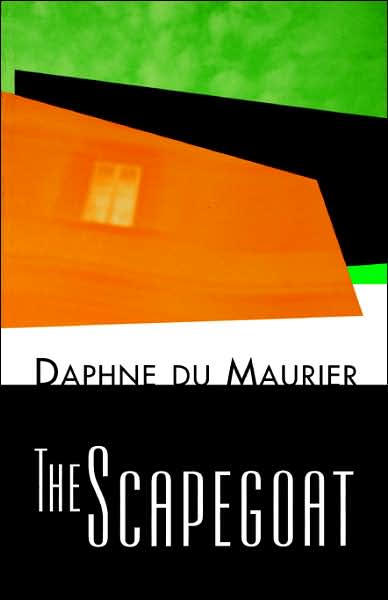The Scapegoat (1957) is probably my favourite Du Maurier, it’s certainly the one I read most often. It was published, like all her books, as mainstream bestseller and eight years after Tey’s Brat Farrar—I have no idea whether Du Maurier had read Brat Farrar or been influenced by it. It’s in the same double identity genre, but a very different kind of story.
John, the first person narrator, is lonely and miserable and wants to be French. He’s thinking about becoming a Trappist monk. He meets his double, Jean de Gue, a French count, in a railway station bar in Le Mans, and without any volition on his part he’d forced to change places with him. He knows nothing about de Gue’s family or circumstances or life, he has to improvise. He’s suddenly thrust into what he wants—having a family, being French, having responsibilities, belonging to people and a place—and he has to cope with it as best he can.
The last time I wrote about a Du Maurier here very few people had read it, so I’m expecting that this is also the case with this much better book. I commend it to your attention—it’s fascinating, and a book a genre reader will really enjoy. For a start it’s a view on an alien culture—the gentry of France twelve years after the end of the Occupation. Then it’s a fascinating story of deception and discovery—the slow discovery of the circumstances of Jean de Gue’s life.
The resemblance in this case is being truly identical. When the two men meet, Jean de Gue asks John “You’re not the devil, by any chance?” There’s no question of actual relationship—they are just coincidentally exactly the same. Nobody suspects from looking or talking to John that he is not Jean, though his dog won’t have anything to do with him. The resemblance and meeting may be supernatural, in which case I’d claim the book as fantasy, but it’s not explicitly more than hinted at. We just have to accept that the two men are identical, their voices, their scents, everything down to the smallest detail. The least plausible thing to me is the language—though John is a lecturer in French history, how could someone so solitary really be so fluent? We’re told that though John has never used the “tu” form before, he uses it naturally when he needs to. He’s never been in this part of the country before, either. Suspend your disbelief and take it as a given.
John goes completely unprepared into Jean’s life. Jean has a chateau, a glassworks, a wife, a mistress, a lover, a brother, a mother, a daughter and a sister who hasn’t spoken to him for fifteen years. The whole context is strange to John, who has to find ways of dealing with all of these things—and Jean’s life really does feel as complex as real life, and the tightrope John walks through it keeps you holding your breath as you read.
Plotwise, this is a very melodramatic book. Brat Farrar is a mystery, a genre considered sensational, but the events are far more plausible than the events of The Scapegoat. Yet the first person narration is solid enough to carry me through, and the mystery of Jean’s life and history is interesting enough to pull the story forward. What seems to be a too-convenient event partway through turns out to be a disaster in disguise. The story won’t disappoint you.
The book was published in 1957 and set at the same time, and this is a book that is absolutely and unquestionably set in our world. Du Maurier clearly expected her readers to be deeply familiar with the events of WWII as they affected France. She doesn’t bother to include anything about the Occupation, the Resistance, or Collaboration—she expects this to be utterly familiar. When it was first published it would have been. I first read this when I was a teenager in the seventies, and I only knew the broad outlines. This is not a book that’s going to teach you any history. However, the way the characters take the history utterly for granted is illuminating. This is how people are about history they have lived through; telling stories about it to other people who have lived through it. We have to fake that when we’re writing in other worlds, but it’s worth the trouble of doing it. It’s worth paying attention to the way the personal histories here interlock with broader history, and the pacing of revelation around that.
The story takes place over one very intense week, in which everything changes. The details are wonderful—daily life, the house and food, and the characters of Jean’s family, all of whom have secrets. This is a book about getting what you want and coping with it, about identity, about belonging. John is a colourless man forced to take on colour and animation—a man forced into life. But John deals better with Jean’s life than Jean has been dealing with it, while Jean—well, Jean had his own reasons for disappearing and leaving an imposter in his place. This is a character study of two men, of what you can learn through presence and absence, light and shadow, love and hate.
I think that’s as much as I can say without spoilers. This is another book that grabs me so much it’s hard for me to put down.
It stops at the right place for it to stop, but still, I’ve often wondered what happened after the end.
Jo Walton is a science fiction and fantasy writer. She’s published eight novels, most recently Half a Crown and Lifelode, and two poetry collections. She reads a lot, and blogs about it here regularly. She comes from Wales but lives in Montreal where the food and books are more varied.










